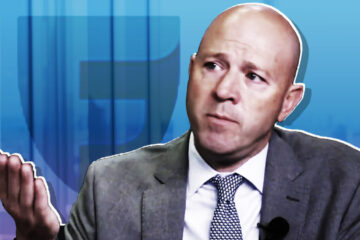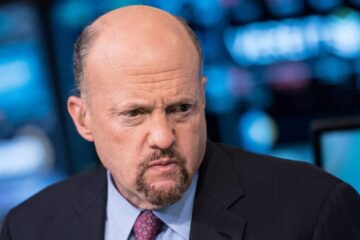Cathie Wood, head of Ark Investment Management, is known for making bold bets on disruptive innovation, mostly in the U.S.
But this week, she looked abroad, buying an Asian chipmaker as investor optimism around AI infrastructure and semiconductors returns following signs of easing tariffs.
💵💰Don’t miss the move: Subscribe to TheStreet’s free daily newsletter 💰💵
In April, President Donald Trump raised tariffs on Chinese goods to as high as 145%, prompting swift retaliation from Beijing and triggering a sharp market sell-off as tensions flared between the world’s two largest economies.
Earlier this month, the U.S. and China struck a rare deal in Geneva to temporarily cut tariffs as both sides work toward a broader agreement.
Wood’s funds saw a brief bump after Trump won the presidency last November, but that momentum didn’t go far. Her flagship Ark Innovation ETF (ARKK) underperformed the S&P 500 index amid broader market volatility.
Year-to-date, ARKK is down 2.67%, slightly worse than the S&P 500’s loss of 1.34%.
Wood gained a remarkable 153% in 2020, which helped build her reputation and attract loyal investors. Still, her long-term performance has made many others skeptical of her aggressive style.
As of May 23, Ark Innovation ETF, with $5 billion under management, has delivered a five-year annualized return of negative 1.75%. In comparison, the S&P 500 has an annualized return of 16.20% over the same period.
The Ark Innovation ETF has seen a net outflow of $2.45 billion over the past 12 months through May 21, with $446.69 million exiting in the past month, according to ETF research firm VettaFi.
Image source: Paras Griffin/Getty Images
Cathie Wood’s investment strategy, explained
Wood’s investment strategy is straightforward: Her Ark ETFs typically buy shares in emerging high-tech companies in fields such as artificial intelligence, blockchain, biomedical technology, and robotics.
Wood says these companies have the potential to reshape industries, but their volatility leads to major fluctuations in Ark funds’ values.
Related: Cathie Wood’s net worth: The Ark Invest CEO’s wealth & income
The Ark Innovation ETF wiped out $7 billion in investor wealth over the 10 years ending in 2024, according to an analysis by Morningstar’s analyst Amy Arnott. That made it the third-biggest wealth destroyer among mutual funds and ETFs in Arnott’s ranking.
Wood recently said the U.S. is coming out of a three-year “rolling recession” and heading into a productivity-led recovery that could trigger a broader bull market.
In a letter to investors published on April 30, she dismissed predictions of a recession dragging into 2026, as she expects “more clarity on tariffs, taxes, regulations, and interest rates over the next three to six months.”
“If the current tariff turmoil results in freer trade, as tariffs and non-tariff barriers come down in tandem with declines in other taxes, regulations, and interest rates, then real GDP growth and productivity should surprise on the high side of expectations at some point during the second half of this year,” she wrote.
She also struck an optimistic tone for tech stocks.
“During the current turbulent transition in the US, we think consumers and businesses are likely to accelerate the shift to technologically enabled innovation platforms including artificial intelligence, robotics, energy storage, blockchain technology, and multiomics sequencing,” she said.
But not all investors share Wood’s optimism. The Ark Innovation ETF has seen a net outflow of $2.45 billion over the past 12 months through May 21, with $446.69 million exiting in the past month, according to ETF research firm VettaFi.
Cathie Wood buys $46 million of Taiwan Semiconductor stock
On May 19 and 20, Wood’s Ark funds bought 241,047 shares of Taiwan Semiconductor Manufacturing Company, or TSMC (TSM) .
That chunk of stock is valued at roughly $46.3 million and is one of Wood’s biggest recent trades.
Related: Cathie Wood buys $2.7M surging China tech stock after tariff talks
Taiwan Semiconductor is the world’s leading contract chipmaker and a key supplier to Nvidia (NVDA) and Advanced Micro Devices (AMD) . It manufactures advanced chips used in artificial intelligence applications, including those that power large language models developed by companies such as Microsoft (MSFT) and Google (GOOGL) .
TSMC shares are down 4.2% so far in 2025, but the stock has rebounded sharply in the past month, climbing nearly 27% as investors reassess the impact of U.S.-China tariffs on the chipmaker’s outlook.
In April, the company reported strong first-quarter results, with earnings per share increased 60.4% to $2.12 per ADR. Revenue reached $25.53 billion, a 41.6% increase year-over-year.
For the current quarter, TSMC expects revenue of $28.4 billion to $29.2 billion. The midpoint of $28.8 billion topped Wall Street’s target of $26.92 billion.
“Moving into second quarter 2025, we expect our business to be supported by strong demand for our industry-leading 3-nanometer and 5-nanometer technologies,” TSMC Chief Financial Officer Wendell Huang said.
The bullish bet isn’t without risk. TSMC is exposed to geopolitical tensions and trade uncertainties between the U.S. and China, which could hurt the company’s delivery and revenue.
“While we have not seen any changes in our customers’ behavior so far, uncertainties and risks from the potential impact from tariff policies exist,” Huang said in a TSMC news release.
Nvidia’s CEO, Jensen Huang, said last September that Nvidia had the ability to turn to other suppliers as it had enough intellectual property. But he flagged that the switch might lower chip quality.
More Nvidia:
Will Nvidia get hit hard by AI capex risk?Analysts revise Nvidia price target on chip demandSurprising China news sends Nvidia stock tumbling
“Maybe the process technology is not as great, maybe we won’t be able to get the same level of performance or cost, but we will be able to provide the supply,” Huang said at Goldman Sachs’s Communacopia + Technology Conference. “In the event anything were to happen, we should be able to pick up and fab it somewhere else.”
Still, he praised TSMC’s unmatched capabilities.
“TSMC is the world’s best by an incredible margin…the great chemistry, their agility, the fact that they could scale,” he added.
In the first quarter, Wood purchased 8,996 TSMC shares. The stock is not in her top 10 holdings.
Billionaire investor Stanley Druckenmiller also made a bold bet in TSMC, adding 491,265 shares in the first quarter, which represents an increase of 456.9% in his stake.
Related: Veteran fund manager unveils eye-popping S&P 500 forecast


